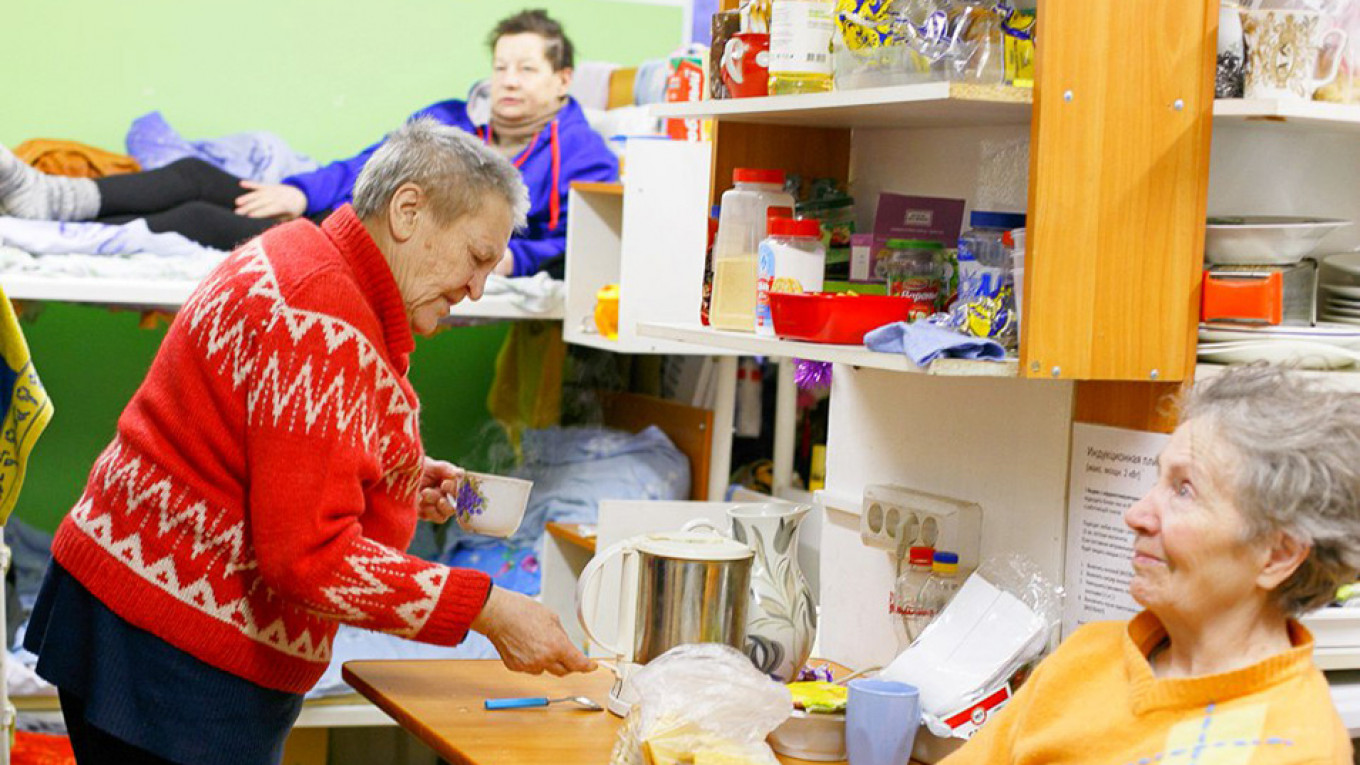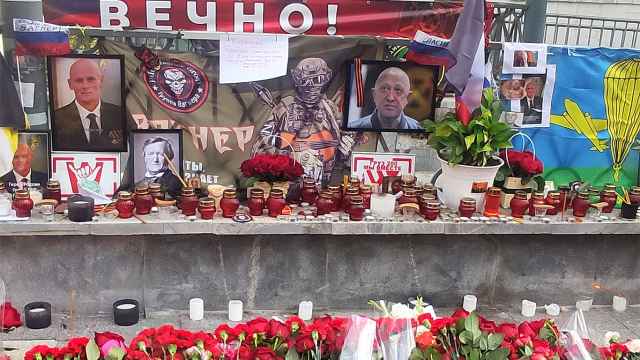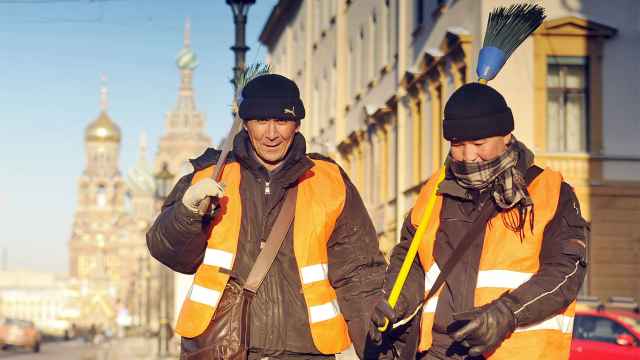ST. PETERSBURG – Just under a year ago, Dima Knyazev was sleeping rough in the Russian capital Moscow, stealing clothes from big department stores and selling them on the street to fund a drug habit he had picked up while in prison.
Today, thanks to a charity in the country’s second-largest city of St. Petersburg, Knyazev, 31, has successfully turned his life around. He’s been clean for nine months, is working as a volunteer helping other homeless people and has passed his post-imprisonment supervision period.
“No matter where I went for help in Moscow, I was constantly turned down because I didn’t have the right documents or was put on a waiting list that never seemed to get any shorter — the wait is so long that most people drink themselves to death or freeze before they get an appointment,” Knyazev told The Moscow Times.
Shelter, food and counseling
The Nochlezhka NGO — the name means “overnight stay” in Russian — was founded in 1990 and over the past three decades has become Russia’s most prominent and successful homeless charity.
It runs over a half a dozen programs in St. Petersburg — funded mostly through donations from individuals and private companies — and provides homeless people with shelter, food, counseling and other necessities. The organization’s most successful project is the comfortable four-story rehabilitation shelter where Dima now lives with around 50 other people.
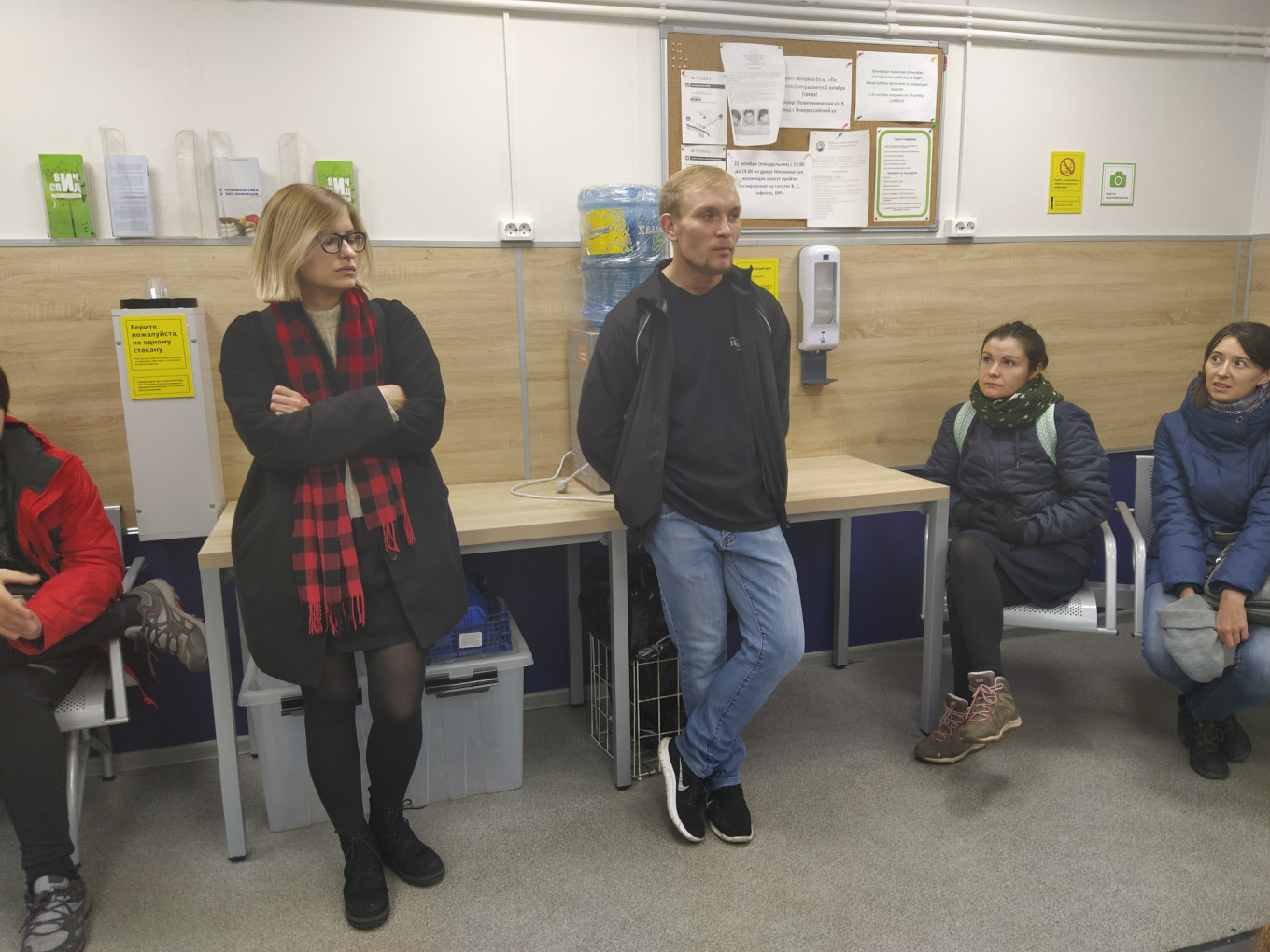
Last year, 145 homeless people passed through the shelter and 51% of them have now succesfully returned to having a permanent home. In all, the organization says its projects helped more than 9,000 people in St. Petersburg in 2018.
But Nochlezhka’s aims are not just material — it is also pursuing a relentless media campaign to reduce the stigma around homelessness in Russia.
“Our main goal is to help homeless people return to normal life, but we also want as many people as possible to know that the problem of homelessness exists and to understand the reasons why people find themselves on the street,” Nochlezhka’s outreach coordinator, Ekaterina Cheremisina, told The Moscow Times.
‘Take your bums and go back to St. Petersburg’
That stigma is still strong in Moscow, which has something of a tradition of hiding the homeless from view that has remained from the Soviet period — linked to the popular perception that it’s a person’s own fault if they end up living on the streets.
Just last year, prior to the 2018 FIFA World Cup, Moscow authorities moved several organizations helping the homeless out of central neighborhoods.
“We can’t move everyone out 101 kilometers away from Moscow, like during the 1980 Olympics,” said Yelena Morozova, the head of the public advisory council to political parties at the Moscow City Duma, “but we must safeguard the guests of our capital from the criminal aspects of this phenomenon [homelessness]."
When Nochlezhka held a public hearing on plans to open a small shelter in Moscow this September, a local deputy interrupted the presentation to shout: “Take your bums and go back to St. Petersburg!”
It was the second project that Nochlezhka had to abandon in the capital after opposition from locals.
That’s despite estimates that there are around three times more people living on the streets of Moscow than in St. Petersburg — and there simply aren’t enough shelters to accommodate them. NGOs estimate that somewhere between 50,000 and 100,000 people are homeless in Russia’s capital, with only about 1,500 total beds available in shelters around the city.
Meanwhile, police officers and Cossack patrols have been accused of assaulting homeless people in Moscow’s city center and ordering them to move to other areas.
This August, a group of men in camouflage uniforms — believed to be part of a Cossack patrol that receives government funding — attacked and beat homeless people waiting in a line outside the offices of a charity.
“The government’s policies toward homeless people in Moscow are not directed at helping them but at reacting to the calls of residents who are for some reason inconvenienced by homeless people,” Nochlezhka’s director in Moscow, Daria Baibakova, was cited as saying after the attack. The charity filed a complaint with police over the incident.
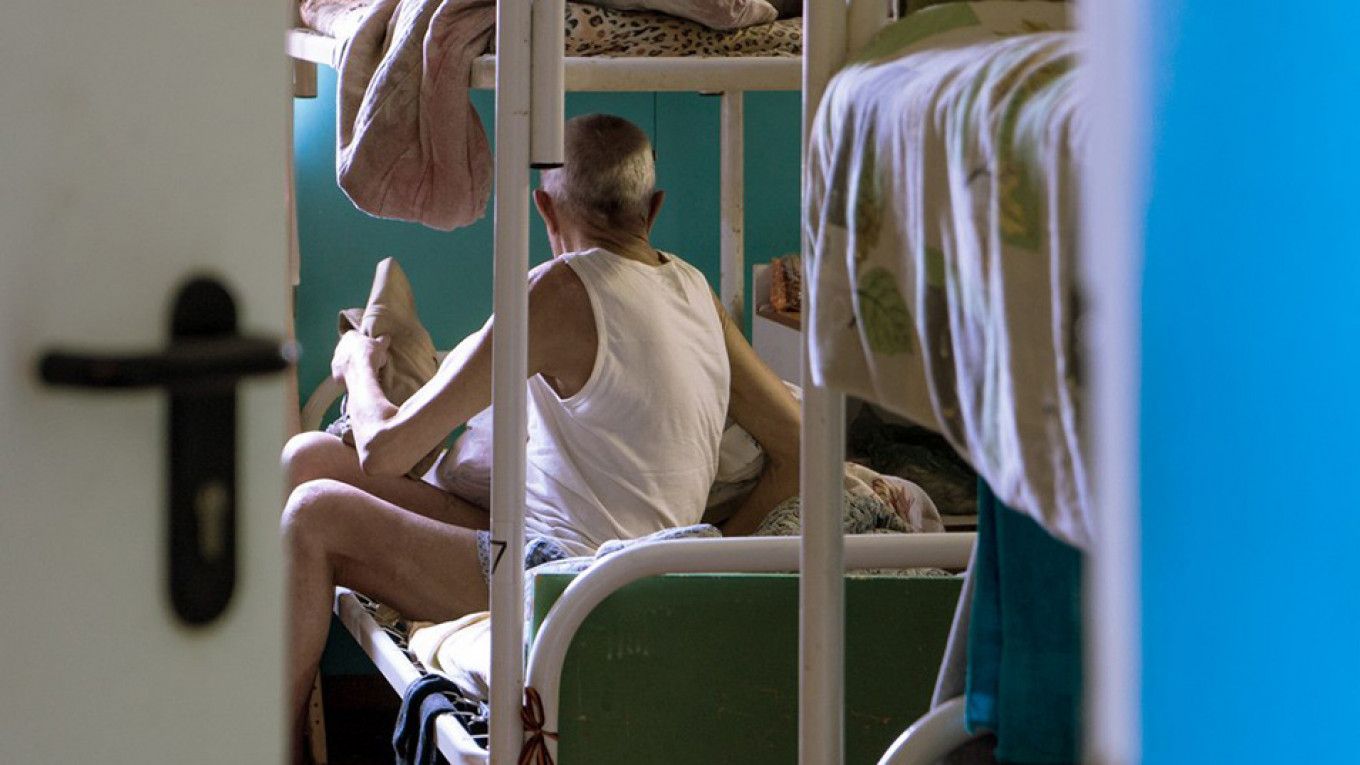
A report on homelessness issued by the presidential Human Rights Council earlier this year noted that there is a tendency in Moscow to “push out facilities that help homeless people from the center of the city and move them to industrial areas on the outskirts, or entirely out of city limits.”
It also criticized discriminatory and "absurd" practices in the Moscow region that bar people without citizenship from receiving help at institutions that help the homeless.
Social workers and homeless people who spoke to The Moscow Times say that attitudes to homelessness in St. Petersburg are not as harsh as in the capital and that Nochlezhka has played a big role in changing them over the years.
The NGO regularly stages advocacy campaigns on billboards in St. Petersburg, charity concerts led by top Russian musicians and donation drives with local businesses.
“In the 29 years since we started, public attitudes to homeless people in St. Petersburg have changed on a fundamental level,” Cheremisina said, using as an example the hundreds of donors who donated money to the NGO last month during a fundraising campaign hosted by local cafes.
The charity’s high profile has also led big companies in the city — like the Hilton hotel chain and restaurants on New Holland Island — to offer some of Nochlezhka’s residents work experience and training programs, and other businesses have donated things like furniture, household appliances and fuel.
Meanwhile, St. Petersburg’s government has supported several Nochlezhka projects and has even opened homeless shelters and heated tents in the city that mimic those of the charity — though they require residents to have a Russian passport.
“There still aren’t enough projects in the city but we can see that the local government is very eager to take up these projects and build on our experience,” Cheremisina said.
In an unexpected turn last month, the local district administration in St. Petersburg where Nochlezhka’s shelter is based defended it against claims made by opponents.
“There is no evidence of a mass migration of homeless people into the neighborhood of the shelter and there have been no complaints from locals about Nochlezhka’s activities,” the local administration wrote in response to an inquiry from Moscow.
Shelter from the cold
When Knyazev first arrived at the Nochlezhka shelter in St. Petersburg, he was immediately checked over by a doctor, talked to a social worker for the first time and finally found himself with a roof over his head. Shelter staff then helped him develop a personalized program for transitioning out of homelessness.
Five times a week, Nochlezhka’s lawyers, psychologists and social workers provide free consultations for low-income people who come to the center with questions about how to restore their identity documents, get state medical insurance and find employment. On site, they can also take showers and receive free medical assistance and clothes.
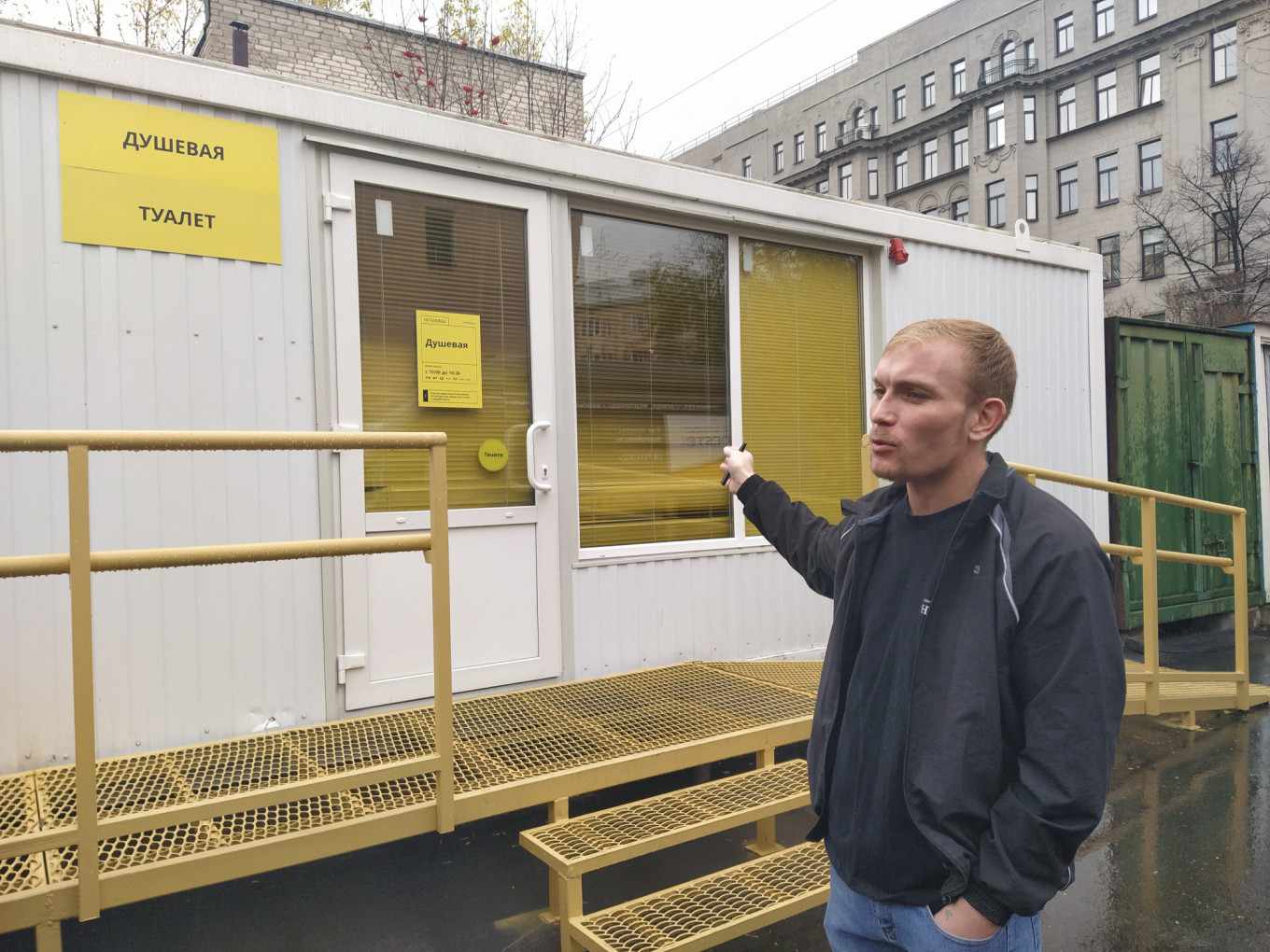
“You might not have any documents at all or still have a Soviet passport, but if you come to us for help, you will be helped,” Cheremisina said.
Nochlezhka also operates two heated tents in the winter months, helping to save dozens of people from the bitter cold. According to official statistics, nearly 1,000 homeless people die on the streets every winter in St. Petersburg.
A converted minibus also makes daily runs around the city in the evenings to serve hot food that is donated by local restaurants.
New projects by the NGO include a second shelter with spaces for 40 people, a free laundry and a halfway house for people suffering from drug and alcohol addiction.
“In St. Petersburg, I see that the help given to homeless people actually works,” Knyazev told two dozen people during a tour that he led of his shelter late last month.
Nochlezhka took the criticism it attracted when it tried to open a shelter in Moscow last year in its stride.
“We ran into a great number of prejudices that are built on the idea that the shelter isn’t safe from a medical point of view — to the extent that people think that it will bring an epidemic of HIV that will somehow affect them,” Cheremisina said.
Changing attitudes
She added that the only thing the organization can do is explain to Muscovites what the projects are like in reality, who homeless people are and how they end up on the street, and hope that one day attitudes will change.
“The discussion about homelessness happened a long time ago in St. Petersburg and is largely finished, whereas in Moscow it’s only recently begun,” she said.
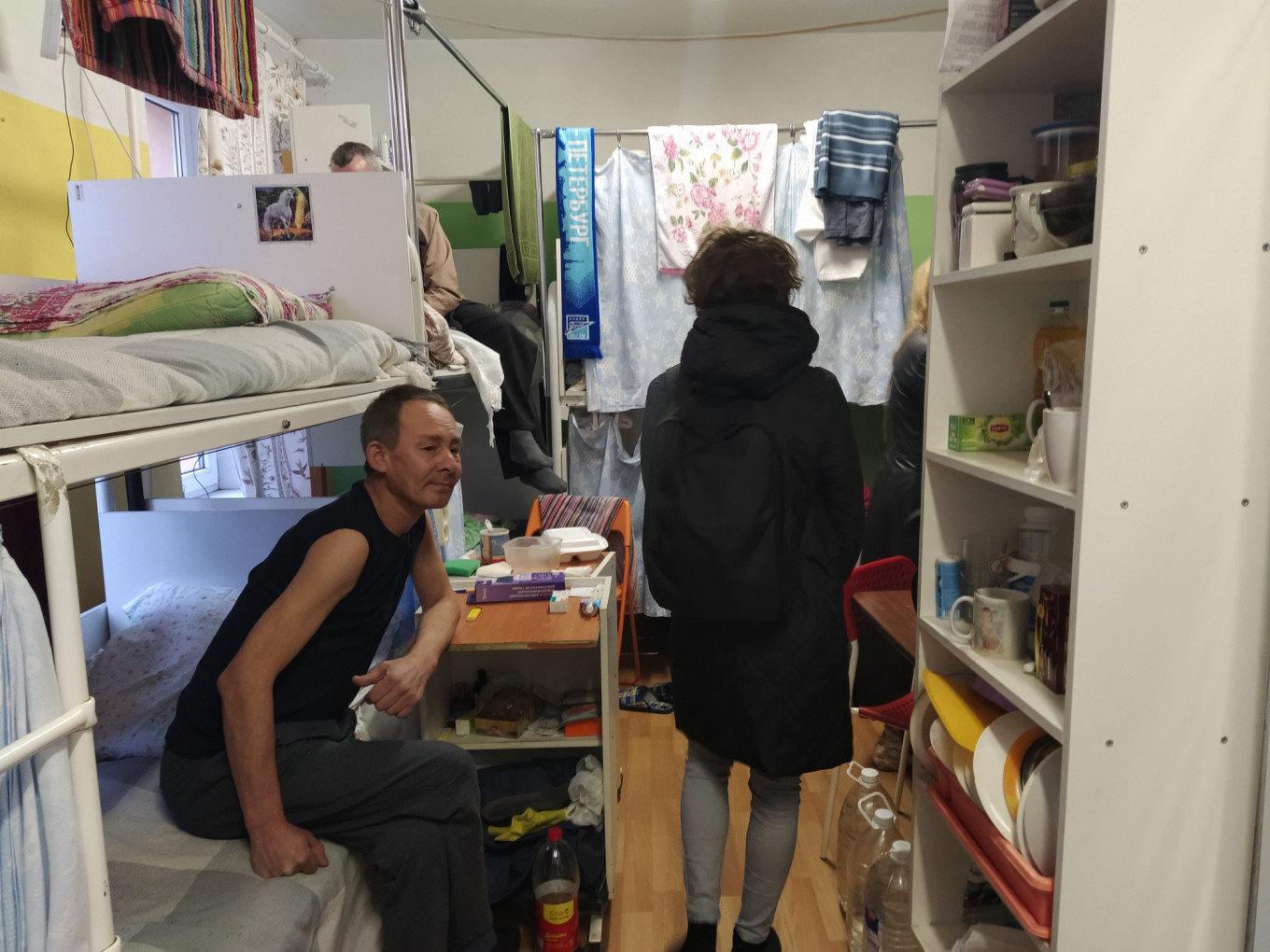
Knyazev said he contacted many organizations helping homeless people while living in Russia’s capital, but often had to sleep on the street after arriving at a shelter only to find it was full.
“They have social workers and I can’t say they’re bad, but they just can’t help everyone who needs it,” he said.
In an attempt to breathe life back into its plans for a project in Russia's capital, Nochlezhka is planning to host a charity concert in Moscow later this month featuring popular young artists like Face and Ic3peak. Proceeds will go toward the opening of a new shelter and counseling service in Moscow.
Back at the homeless shelter in St. Petersburg, Dima is telling his audience about his life as a homeless man in Russia.
“God forbid that your kids or loved ones ever find themselves in this situation,” he says. “But if they do, you will always know that there are centers out there that can help.”
A Message from The Moscow Times:
Dear readers,
We are facing unprecedented challenges. Russia's Prosecutor General's Office has designated The Moscow Times as an "undesirable" organization, criminalizing our work and putting our staff at risk of prosecution. This follows our earlier unjust labeling as a "foreign agent."
These actions are direct attempts to silence independent journalism in Russia. The authorities claim our work "discredits the decisions of the Russian leadership." We see things differently: we strive to provide accurate, unbiased reporting on Russia.
We, the journalists of The Moscow Times, refuse to be silenced. But to continue our work, we need your help.
Your support, no matter how small, makes a world of difference. If you can, please support us monthly starting from just $2. It's quick to set up, and every contribution makes a significant impact.
By supporting The Moscow Times, you're defending open, independent journalism in the face of repression. Thank you for standing with us.
Remind me later.



